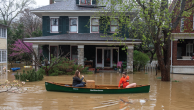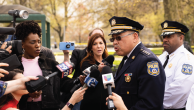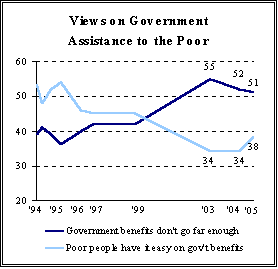
As the Hurricane Katrina recovery effort unfolds along the Gulf Coast, there has been considerable speculation about the disaster’s possible impact on fundamental public attitudes on such questions as the role of government, the plight of the poor and the extent of racial progress in the U.S.
On the left, some have expressed the hope that Katrina will turn the public’s attention to the ongoing hardships of the poor and needy, leading to a revival of support for government assistance programs. Some on the right believe the widespread perception that government failed in responding to the crisis could bolster conservative efforts to limit government’s role generally. And across the ideological spectrum, many wonder if the fact that so many of Katrina’s victims were black will trigger a re-evaluation of race relations in this country.
However, a recent survey by the Pew Research Center, conducted Sept. 8-11 among 1,523 Americans, suggests that while Katrina’s impact has already been felt politically in somewhat lower ratings for the president, for instance it has had far less of an impact on long-term values relating to poverty, race and government. In this regard, the initial public reaction to the crisis appears to be far more tempered than to the Sept. 11, 2001 terrorist attacks, which dramatically raised esteem for government and transformed, at least temporarily, public values in many other areas.
Poverty and Race
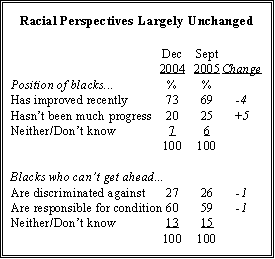
Americans broadly support the disaster relief effort, but there is no evidence that basic attitudes on poverty and the government’s role in addressing the issue have been altered by Katrina. Currently, a narrow 51% majority expresses the view that poor people have hard lives because government benefits don’t go far enough to help them live decently; 38% think poor people have it easy because they can get government benefits without doing anything in return.
This is consistent with Pew values surveys conducted over the last two years. In December 2004, 52% agreed that the poor had hard lives because of inadequate government support while 34% agreed with the alternative statement.
Similarly, the hurricane and its aftermath appear to have had little effect on Americans’ views of the impact of racial discrimination on the lives of African Americans. By more than two-to-one (59%-26%), more Americans say that blacks who can’t get ahead in this country are mostly responsible for their own condition, rather than being held back by racial discrimination. That is unchanged since December 2004 (60%), and comparable with results dating to 1994.
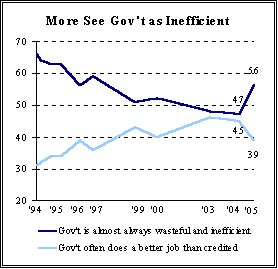
Nearly seven-in-ten Americans (69%) continue to feel that the position of blacks in American society has improved in recent years, down only slightly from last year (73%). Notably, opinion among African Americans on this measure is identical to what it was in December 2004; 56% say that the position of blacks in society has improved. Roughly seven-in-ten whites (72%) agree, down somewhat from December 2004 (77%).
More See Government as Wasteful
Over the last decade, Pew’s values surveys have tracked a gradual but substantial change in cynicism about government waste and inefficiency. Americans are far less critical of government now than in the mid-1990s. This shift has been most pronounced among Republicans, whose hostility toward government diminished considerably after the party gained control of the White House and Congress in 2000.
Democrats, by contrast, became somewhat less supportive of government when their party lost power. The net effect of these changes was that the once wide partisan gulf on questions relating to government efficiency had all but disappeared by the end of last year.
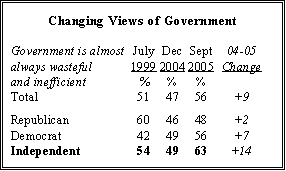
But in Katrina’s aftermath, there has been a rise in the number of Americans who view government as almost always wasteful and inefficient from 47% last December to 56% currently. The increase has come among Democrats (up seven percentage points) and especially independents (14 points).
However, it remains to be seen whether this represents a fundamental shift in views of government among independents and Democrats, or a more focused backlash against the government’s handling of Katrina. In Pew’s most recent survey (Sept. 8-11), just 27% of independents and 24% of Democrats said the federal government had done an excellent or good job in responding to Katrina. Notably, independents were even more critical than they had been just a few days earlier (Sept. 6-7), when 35% gave positive ratings to the government’s handling of the hurricane and its aftermath.
But Trust in Government is Unchanged
But public trust and confidence in government, while low, is no lower than it was in the summer. Currently, about three-in-ten (31%) say they can trust the government in Washington to do the right thing just about always, or most of the time. That is virtually unchanged from a Gallup survey in June (30%).
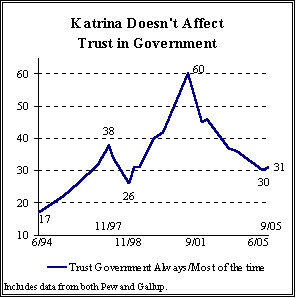
While Katrina has not further weakened the public’s trust in government, there nonetheless is a striking contrast between the public’s lackluster feelings about government and the strongly positive opinions seen in the immediate aftermath of 9/11. In October 2001, Gallup found 60% saying they could trust the government just about always or most of the time the highest level recorded since 1968 in surveys conducted by the University of Michigan’s National Election Study.
About this Survey
Results for this survey are based on telephone interviews conducted under the direction of Princeton Survey Research Associates International among a nationwide sample of 1,523 adults, 18 years of age or older, from Sept. 8-11, 2005. For results based on the total sample, one can say with 95% confidence that the error attributable to sampling is plus or minus 3 percentage points. For results based on form 1 (N=758) and form 2 (N=765) the sampling error is plus or minus 4 percentage points.
In addition to sampling error, one should bear in mind that question wording and practical difficulties in conducting surveys can introduce error or bias into the findings of opinion polls.
